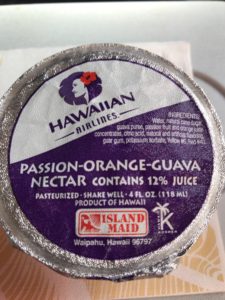Lunch and Learn: More Economic-Loss Rule Uncertainty in Section 75-1.1 Claims, this Time with More Juice Cups
Today’s blog post is about a recent Fourth Circuit opinion, Foodbuy LLC v. Gregory Packaging, Inc., involving the intersection of N.C. Gen. Stat. § 75-1.1 and everyone’s favorite school lunch item—juice cups. As a bonus, the Fourth Circuit also waded into the unsettled question of whether the economic-loss rule can bar a section 75-1.1 claim. So please, find a seat at the popular kids’ table if you can, and we’ll open up that foil topping and take a nice long sip.
 The Juice Cup Distribution System
The Juice Cup Distribution System
For most people of my generation, if the juice cup didn’t come with your lunch, at worst, you had to throw in an extra quarter to get one. It turns out that—at least today—the distribution chain to get that cup to your average elementary school lunchroom is quite a bit more complex.
The defendant in this case, Gregory Packaging (or GPI), manufactures juice cups. These include delicious juices ranging from apple and grape to apple/cherry or orange/pineapple. Plaintiff Foodbuy, LLC is a group purchasing organization (or GPO) that pools institutional purchasers to secure favorable pricing.
Without diving too deeply into the different methods for juice-cup distribution, the relevant method here is where a customer (such as a school or hospital) pays the distributor directly for juice cups but pays a price negotiated by the GPO. The GPO (here, Foodbuy) then invoices the manufacturer (here, GPI) for a volume-allowance rebate for each case of juice sold. And don’t worry, there won’t be a pop quiz on the differences between GPI and GPO, or CPI and C-3PO.
The crux of this case revolved around a supplier agreement between Foodbuy and GPI. This Agreement came with an “Attachment A” that listed the products that fell under the Agreement along with their respective prices. Importantly, these prices applied only when the sales were made by GPI to “Foodbuy Distributors” on behalf of “Committed Customers.”
The Juice Rotted
The court noted that the parties’ relationship “soured” in early 2015. GPI discovered that Foodbuy had been charging the volume allowance for every case of juice that the Committed Customers bought, not just the ones bought through the Foodbuy program. At that point, GPI stopped paying the volume allowance at all, and after a few months of disagreement, litigation ensued.
Even though GPI was the party who first discovered it had been wronged, Foodbuy was first in line for litigation. Foodbuy brought a breach-of-contract claim, asserting that GPI was overcharging the Committed Customers. GPI counterclaimed with its own breach-of-contract claim based on over-invoicing relating to the volume allowance, and also added on other claims, including a claim under section 75-1.1.
The District Court’s Decision
The district court held a bench trial and ruled in GPI’s favor. It disposed of Foodbuy’s overcharging claim on standing grounds because the higher prices that Foodbuy complained about were paid by the Committed Customers, not by Foodbuy itself. The district court then found in favor of GPI on its breach-of-contract claim with two alternative holdings.
First, the district court determined that the Agreement was unambiguous and that its plain language required GPI to pay the volume allowance only for purchases made through the Foodbuy program. Second, the court found that even if the Agreement was ambiguous, several rules of contract interpretation led to the same result.
Turning to GPI’s section 75-1.1 claim, the district court held that the economic-loss rule barred the claim. The district court also held that GPI failed to provide competent evidence of the substantial aggravating circumstances required for a section 75-1.1 claim based on a breach of contract. After all, the court had also dismissed GPI’s fraud and fraudulent-omission counterclaims.
A Nominal Damages Detour
The Fourth Circuit affirmed the dismissal of Foodbuy’s claims for lack of standing. One interesting side note about that holding—Foodbuy advanced an argument on appeal that it was entitled to nominal damages and that entitlement alone created standing. The Fourth Circuit did not reach that novel argument because Foodbuy’s complaint did not seek nominal damages, and its boilerplate “other and further relief” language did not suffice to advance such a theory when the complaint did not mention nominal damages.
Don’t Put All Your Apples in One Basket
On appeal, Foodbuy engaged only with the district court’s finding that the Agreement was unambiguous. Foodbuy agreed that the Agreement was unambiguous but argued that its language should be interpreted in its favor. Foodbuy did not engage at all with the district court’s alternative holding that the contract was ambiguous.
The Fourth Circuit disagreed with Foodbuy on both points, finding that the Agreement was ambiguous. But since Foodbuy did not present any argument in its opening brief on this point, it waived any challenge to the district court’s judgment on that point, and the Fourth Circuit affirmed.
The Section 75-1.1 Claim Went Back to School (the District Court)
Moving to the section 75-1.1 claim, the Fourth Circuit, like our blog, cautioned that “North Carolina courts have never addressed whether UDTPA claims are subject to the [economic-loss rule].” Thus, the district court’s dismissal on that ground was error.
As to the alternative ground advanced by the district court—the dismissal of GPI’s fraud-based claims—the Fourth Circuit agreed with GPI’s position that the district court improperly conflated its fraud claims with the section 75-1.1 claim. Citing to an earlier Middle District of North Carolina opinion, the court noted that the elements for a fraud claim are different from those required for a section 75-1.1 claim. The Fourth Circuit sent the case back to the district court so that it could consider the section 75-1.1 claim “through a fresh lens in conformity with this opinion.”
Conclusions
At the end of the day, the Fourth Circuit is not going to clear up the open state-law question of whether the economic-loss rule applies to section 75-1.1, so it erred on the side of not applying the doctrine absent North Carolina precedent finding otherwise. The case is also a good reminder that “unfair or deceptive” practices need not be fraudulent in order to be actionable. Thus, the dismissal of a fraud claim will not necessarily lead to the dismissal of a section 75-1.1 claim.
Author: Jamie Weiss


